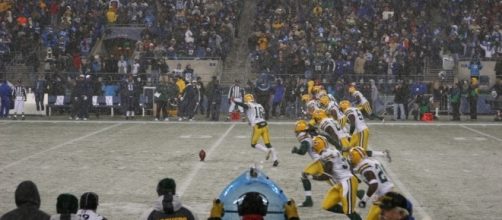During this nice summer weather, it may be hard to imagine a blustering snow game in late December. But it is something the Green Bay Packers prepare for every single NFL season. Green Bay has never been a city that was afraid of the cold. This goes for both the Packers and their loyal fans. Heck, the city has an outdoor NFL stadium in one of the most frigid parts of America, and they often play late into the coldest months of winter.
Frozen in time
Green Bay is almost notorious for its cold weather football games. Lambeau Field has even been nicknamed the "Frozen Tundra" and for good reason.
The city was home to the famous "Ice Bowl" of 1967, which has been recorded as the coldest NFL game of all time. According to the Wisconsin State Journal, the game averaged at about -13 degrees and -48 degrees with wind chill. The cold was only amplified by the turf's heating system failing.
Green Bay more recently held a game in 2008 that was also insanely cold. Brett Favre's final game as a Packer took place in an overtime game against the Giants and is recorded as the fourth coldest NFL game of all time. The game averaged about -1 degrees and -24 degrees with the wind chill and even resulted in a heartbreaking loss.
Does the cold help them?
There is a clear argument to be made that cold weather can build toughness and character.
Some of the best teams in the league play in the cold, such as the Patriots, Seahawks, and of course, the Packers. But what do the numbers tell us about whether or not cold can act as a tool for the home team?
After looking at a lot of data from Pro Football Reference, one Seahawks analyst found some interesting results from data dating back to 1960. According to the Hawkblogger, colder temperatures impact a lot of key stats. In cold games, there are significantly fewer yards, many more turnovers, and fewer points scored. The stats get very interesting at under ten degrees where the changes become very overt and obvious.
The most interesting way that cold impacts games though is the Margin Of Victory for home teams playing in the cold.
The average margin of victory for the home team goes up heavily as the temperature drops for the home team. According to Hawkblogger the average margin of victory more than quadrupled after going from average 50+ degrees games to cold ten and under degree games.
Home teams typically do better against an opponent when it is cold. Additionally, there have only been a handful of games where an away team has ever handily beat a home team in very cold weather. So even when the home team does lose a cold weather game, the game is usually very close.
Ultimately, this is good news for the Green Bay Packers who have a lot of cold home games throughout and late into their long season. The stats prove what Green Bay has always known, which is that when the cold comes to Lambeau, the Packers will be ready.


